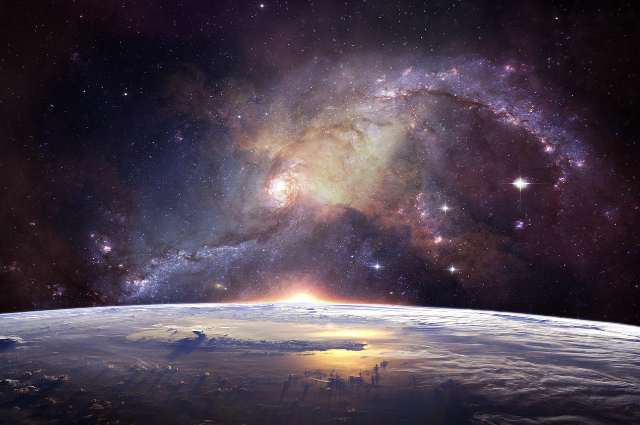
Universe
The universe is an alignment of energy with space and time. Comprises atomic particles, dust, physical matter, and energy, as well as subatomic particles. In the early 20th century, the field of cosmology established that space and time emerged together, as described by the Big Bang theory, and the universe has been expanding since then. The portion of the universe that humans can see is approximately 93 billion light-years in diameter, but the size of the universe is unknown. And at a point in time, the entire universe will form once again. The universe comprises about galaxies, stars, the Milky Way, planets, the solar system, asteroids, and so on. Many of the stars in a galaxy have planets. At the largest scale, galaxies are distributed uniformly and the same in all directions, which states that the universe has no edge nor a centre. At smaller scales, galaxies are distributed in clusters and superclusters.
Here, another most important source of energy is also formed, called light. It also plays a vital role in the universe as like space and time.
Expansion
Over time, the universe and its components have evolved. The more matter there is in the universe, the stronger the mutual gravitational pull of the matter. Before 1998, it was expected that the expansion rate would he decreasing as time went on due to the influence of gravitational interactions in the universe.
The proportions of all types of matter and energy have changed over the history of the universe. The total amount over the history of the universe. The total amount of electromagnetic radiation generated within the universe has decreased by 1/2 in the past 2 billion years. Today, ordinary matter, which includes the galaxies, atoms, stars, and life, accounts for only about 4.9% of the contents of the universe.
One of these cyclical cosmogonies came from the people of your Indus River valley more than four thousand years ago. They practised a religion called Hinduism, the oldest of your planet’s most popular current doctrines. Hindus believe that the God Brahma created the cosmos himself, world like universe world and cosmos were more or less interchangeable before they adopted their modern scientific definitions, and that ours is not the first one he created. Brahma is far desk the only God in the Hindu religion. The idea that there’s a single true god is relatively new. There is also Vishnu, the preserver, who maintains the balance of the cosmos. It’s no wonder that Vishnu
was often associated with the sun, as both were understood to sustain life on earth. To round out the cycle, there’s Shiva, who destroys the universe so that it can be rebuilt. But until that time comes, Shiva is said to destroy the imperfections of your world, and so he is regarded as both good and evil. Together, the three gods, this triumvirate, work to keep the universe moving through its cycle, each doing their part when the time comes, until the end of eternity.
Three thousand years later, and 4,500 miles to the north, Norse tribes were telling their cosmogonies that were somewhat rooted in truth. The stories were passed orally through countless generations, your imperfect human memories and pesky personal preferences introducing slight variations each time, until they were written down in your thirteenth century. Christianity was well established in the northern lands by then; Norse story has that improbable kernel of truth. Life emerged I’m the middle of the abyss, between the worlds of ice and fire, where the temperature was just right.
Energy of the universe
Generally, humans release energy to the universe when they speak or have thoughts, and this energy can be positive or negative. Positive thoughts can significantly contribute to the well-being of people. Major streams like numerology, chemistry, physics, and biology provide information about the relationship among the constituents of the universe.
Christianity and Islam are like, found that there are two major spiritually ranked forces in spiritual realms through energy-producing corrective and constructive sources like listening to music, watching television, reading or listening to teachings, and praying, meditation, joining spiritual groups, dreaming about the future, using fragrances, and doing physical activities like yoga.
Philosophical perspective
The meaning of life is subjected to existence, subjective and individual, while others argue for more objective meanings or even religious beliefs.
Scientific perspective
Scientific perspective states that the understanding universe is all about cosmology, astrophysics, and quantum mechanics. The universe's structure and behaviour can provide insights into the nature, but it doesn’t necessarily offer an intrinsic meaning to life itself.
Religious perspective
Many religious beliefs prove that the universe was created by divine power. And it will be expanded according to human life and karma. Once humans reach the stage of Kaliyugam, the universe will face the nearing end soon. Believers see the universe as a part of a grand design reflecting spiritual truths.
Culture perspectives
There are different kinds of cultures intertwined with the natural universe in many ways, such as tradition, myths, and local beliefs. These interpretations are rooted in historical events or natural phenomena observed over time.
Biological perspective
Evolutionary biology views the universe from a survival perspective - species evolve to survive and reproduce, which could be interpreted as a meaning in the Darwinian context.
Ultimately, understanding the universe’s meaning from a human perspective is deeply personal and can involve integrating insights from various fields of knowledge and belief systems. Each individual may find their unique meanings and experiences through their exploration and self-reflection. And also, the universe is based on the theory of attraction, where when you think positively and you attract positive energy; when your thoughts are negative, the energy also has a negative impact.
References
- Universe. today com
- Future learn.com
